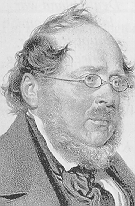| Profile | Major Works | Resources |
Friedrich List, 1789-1846.


Friedrich List was a nationalist/romantic critic of economic theory and one of the
forefathers of the German Historical School.
Born in Reutlingen, the son of a tanner, Friedrich List followed a career as an clerk, accountant and bureaucrat in the Kingdom of Württemberg, rising quickly in the administrative ranks and eventually gaining the ear of influential politicians. Despite his lack of formal education, Friedrich List was appointed professor of cameralistics at the University of Tübingen in 1817, but lost his job in 1819, when his ministerial patrons lost theirs. He never regained a teaching post.
List promptly entered politics, and became a liberal member of the Württemburg legislature. On the chamber floor, List was an advocate of the customs union but even more vocal on administrative reforms. But his political views ruffled feathers, and in 1822, List was expelled from the chamber, and put on trial on charges of sedition. List escaped from Württemburg before the sentence could be implemented. List subsequently wandered around, spending time in Strasbourg, Baden, Paris, London and Basel. List was re-captured while on a family visit to Stuttgart in 1824. List eventually reached an agreement with the authorities, was went into exile in the United States in 1825.
After arriving in the United States, List worked as a journalist for a Germany-language newspaper in Pennsylvania for several years. He came under the influence of protectionists of the "American System", like Henry Clay and the Careys. List soon shifted his earlier economic views away from free trade, and published a local tract (in English) in 1827 that was well-received.
Friedrich List returned to Germany in 1834, in the capacity of US consul in Leipzig (Saxony). List continue writing and promoting his ideas. List was an enthusiastic supporter and one of the main architects of the German customs union (Zollverein) and an early enthusiast and advocate for the establishment of railroads throughout Germany. His own involvement in railroad schemes in Saxony, however, ruined him financially. List's death in 1846 was an apparent suicide.
Friedrich List is best known for his The National System of Political Economy (1841). It was written against the free-trade doctrines that permeated Classical economics. However, List's thesis was not merely a polemical defense of protectionism. List couched his argument on the basis of his analysis of economics, which stressed political factors - notably, the "nation" - in economics. List argued that it was the government's responsibility to foster the "productive powers" of a nation and, once these were in place, then free trade could ensue, but not before. This is akin to the modern "infant industry" argument for protection. Also relevantly, List developed a theory of economic "stages" which was to serve as a blueprint for the later German Historical School.
|
Major works of Friedrich List
|
|
HET
|
|
Resources on Friedrich List
|
All rights reserved, Gonçalo L. Fonseca
